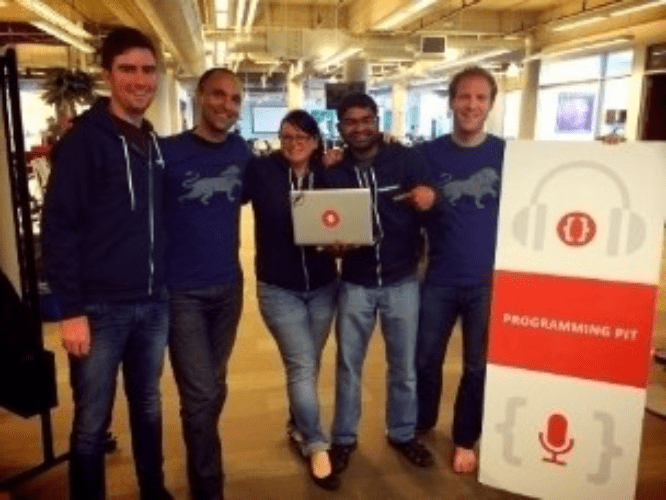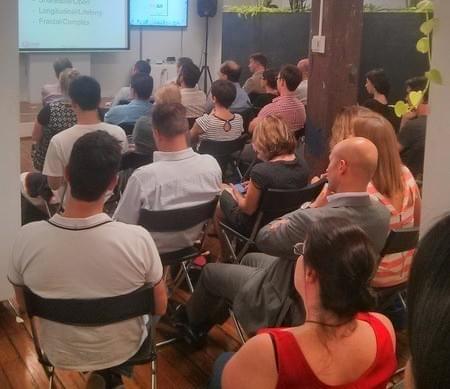
READ THIS: This website is desperately due for an update, and everytime I look at it, I can't help the loving nostalgia for the younger version of me that created it, and I'm not ready to let go yet. If you want something more up-to-date, head to Linkedin.
Hello, I'm Lissanthea.
I'm a Physiotherapist by trade but most of what I do is outside the traditional clinical box. I am a co-founder and clinical director for BrainChanger, a digital therapeutic startup and a co-founder of NarrativeRx a healthcare education company. I write patient-facing educational stories at PainChats, and was part of the founding team that established Pain Revolution in rural Australia.
Current Projects
Here's how I spend my one wild and precious life.
Brain Changer is an Australia-based digital therapeutic platform delivering a 12-week evidence-based pain recovery program.
With patient-led innovation at the core of the program, Brain Changer is designed around digital learning tools and specialised pain coaching to enable health professionals to work remotely within a biopsychosocial framework.
Narrative Rx is an online education company teaching health professionals how to listen (because isn't that what you want in a doctor?)
Narrative medicine uses art and literature as teaching tools to develop the skills of radical listening that are so crucial to ethical and humane healthcare.
Our flagship program is The Bridge, an 8-week online learning program for health professionals that work with people in pain.
PainChats is an online source of free, evidence-based pain information written for people in pain.
It aims to provide hopeful and helpful pain information to people searching for help on the internet (and counters the scary messages that people often receive).
This project was developed alongside Pain Revolution in Australia, although the website has a global impact with people in pain.
What I mean when I say I "hate" Physiotherapy...
I've said this a lot, "I'm a reluctant clinician", or "I hate this profession".
It doesn't mean that I hate what we aim to do, or the importance of the work.
My "hate" comes from a strong desire that we do better, because the world needs a lot of what we're capable of delivering as a profession.
My "hate" comes from the experiences I've had as a clinician with stress and burnout. I've so often felt the need to be the person with "all the answers", which flies in the face of my values about co-creation of outcomes and the conversational nature of truth and reality.
I've often felt like I missed a hazing process or indoctrination that my peers must have had because they always seemed so sure they knew what they were doing. Maybe I just hated supervising people doing their three sets of ten exercises?
Others might use more positive language, but there's so much rubbish that is embedded in the system of how we talk to people, and how we deliver care, that I am sticking with my strong language (for now)!
The Personal Perspective
I never really wanted to be a physiotherapist.
It was one option on a list of many. I barely attended high school, and I certainly didn't visit the careers councillor's office.
I wanted to be a veterinary surgeon, and I just missed out by a tiny fraction of a mark. I'm not sure if I would have loved being a vet, but my love of horses led me there.
I didn't even know what physiotherapists did when I started the course. When I did my first placement in a hospital in second-year, my nagging doubts were confirmed.
This job wasn't for me, but I continued. Perhaps because I like to finish tasks and there were other life "stuff" invariably complicating decision making in my early 20's.
When I was just a youngster at the University of Sydney, I remember thinking "when I get this done, I'll go back and do a real degree". In my mind, a real degree was something like comparative english literature. Luckily Narrative Medicine came along when it did!
If I could time-travel back, I don't know that there was a "better" path. I'm still here, 15 years later, still curious and with more tools for change under my belt.
What I did LOVE in PT School
There was one shining light in PT school, and that was a student placement at what is now the The Michael J Cousins Pain Management and Research Centre.
I had ten weeks here working with the team delivering the ADAPT multidisciplinary pain management program. This was my first exposure to pain and placebo research and to a biopsychosocial perspective of treating pain.
Those ten weeks were the start of a fascination and interest in pain experience and pain science that have kept me in the clinic even if I "hate it".
The research here tells us how we can do better, if we can only work out ways around the system and societal barriers to implementing it.
Professional Growth and Development
I am a lifelong learner, and a very "t-shaped" person. There are a few things I know deeply, and I have very wide experience (and perhaps an overconfidence in the things that I can do!)
I have run away from clinical practice a few times, and never really bought into loving the profession of physiotherapy. I've never ever felt certain of diagnosing someone's experiences of their body and life in the way that I was trained to do.
This questioning curiosity allows me to wear the many hats that I do now as a business leader, clinical coach, educator and program director.
Clinical Expertise
So far, I have spent 18 years and counting solving problems with people on an individual basis as a Physiotherapist.
My workday consists of understanding people by asking questions, fostering empathy, and allowing people to tell their stories in the process of finding a solution to their problem.
Health has so many dimensions and meanings that finding the right solution requires creative problem solving and reasoning. I discovered that while I was treating clients, my mind focusses on designing the interaction and trying to make things that worked for people, and weaving that into the clinical "evidence-based medicine". As so many clinicians realize, context is key when we need people to change how they are living.
Designing Health
Health professionals such as doctors, nurses and allied health professionals dedicate their career to helping others. Care is embedded in our education and our professional standards, and for many it is the ability to make a positive change in the world that gets us out of bed.
Design and innovation in health must consider the role of the clinician, their workflow and their motivations in doing their job, for it to be most effective.
I've been fortunate to work in contexts where I have sat alongside designer, and learned how they think and problem solve.
Designers need to understand time pressures, work stress, empathy fatigue and interactions between clinicians to incorporate solutions to these into design of products and services.
Unless we consider the clinician as a customer of the healthcare system too, we miss the opportunity to create something that can help them help others.
A Person-Centred Approach
Notice I didn't say "Patient-centred"? For too long we have labelled people as patients and made them believe they're passive participants in their health.
People can tell you best what their specific problems are, if you give them the space to co-create the solutions.
People can often tell you why they have trouble doing what health professionals tell them to do. It is rarely that they don't want to get healthy, but more often that life gets in their way.
Designing solutions starts with empathy and understanding, and giving people space to tell their story and have a part in the solution is critical.
Project Retrospective
Left-field things I've done that have grown my skills and abilities

Startup Employee
I escaped from working in health care for a few years to expand my skills in technology and business.
In 2013/14 I worked at AirPair in San Francisco. It was a Y-Combinator backed company and a marketplace for software engineering skills delivered via online pair programming.
My role was blog editor and content creation, plus social media and community management. I developed a sound understanding of content strategy and execution, analytics and social media campaigns.
Through the nature of the business, I also developed a useful working knowledge of programming languages and frameworks, and working with developers.

Service Design
In 2011, I founded The Equestrian Physiotherapist, a specialist niche service catering to the performance needs of Equestrian athletes.
Through my personal understanding of the sport and consultation with athletes and coaches, I was able to craft a service that catered to the unique demands of horse riders. Understanding rider psychology, environment and training patterns enabled me to develop a new service model that has been used by elite riders throughout Australia.

Community Creation
In 2012, I recognised that there was no organised group for health professionals, technologists and designers to come together and share their knowledge, so I started HealthTech Sydney.
This group grew quickly, and attracted a varied cross-section of participants to our monthly meetup events.
I left the group after twelve months to move to San Francisco, and it has continued in my absence to be a hub of connection for founders and startups in health technology in Australia. With 1000+ members, this group continues to be a force for change in the Australian health innovation landscape.
Human History is Told in Narrative
I believe stories matter and help us make sense of the world.
I like to write my adventures down so you can read them on Medium.com.
Let's Talk
We can treat pain better together.
© 2020 Lissanthea Taylor




